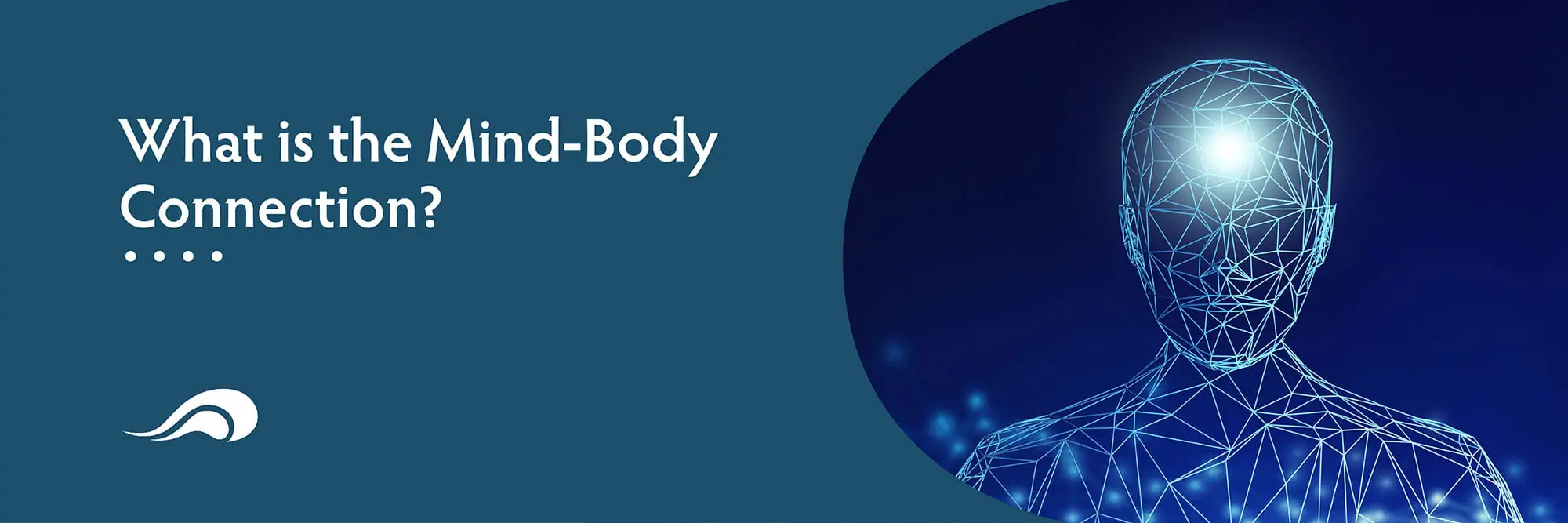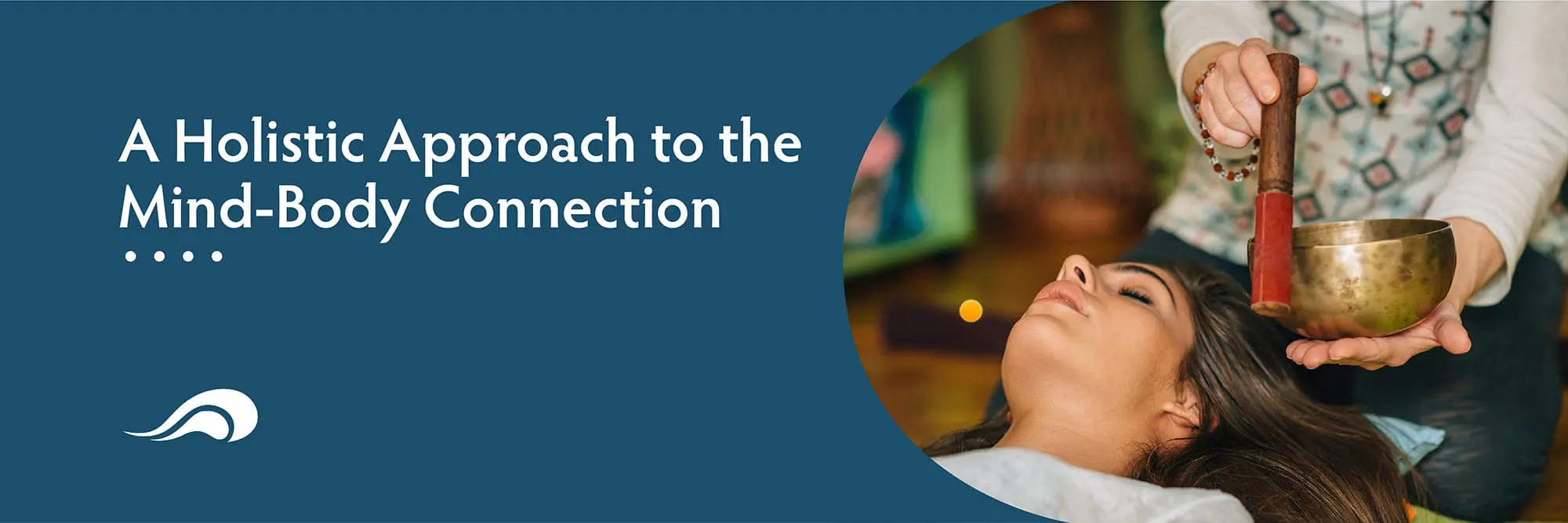Mind Body Connection
Here, we look at how the mind and body are connected and discuss some of the different therapies used in treatment to promote physical and emotional healing and improve quality of life.
What is the Mind-Body Connection?
The mind-body connection can be described as the bond between physical health and emotional, mental, spiritual, social and behavioral health. As research continues to unravel the complex relationship between mind and body, more doctors are prescribing complementary therapies to round out treatment for a wide variety of illnesses and mental health conditions. Using both complementary therapies and traditional therapies is called a holistic approach. According to the Substance Abuse and Mental Health Services Administration (SAMHSA,) a holistic approach to recovery offers the best possible treatment outcomes.

 A Holistic Approach to the Mind-Body Connection
A Holistic Approach to the Mind-Body Connection
A holistic approach to treatment involves a variety of therapies, classes and interventions that support whole-person healing. SAMHSA stresses that there are many pathways to recovery, and no single treatment works for every individual. That’s why high quality, holistic treatment programs create individualized treatment plans based on unique problems, needs and strengths.
Holistic treatment programs address all of an individual’s multiple needs, which fall under four major dimensions. SAMHSA identifies the four major dimensions that support a life in recovery as:
- Health, or overcoming or managing diseases and making informed, healthy choices that support physical and emotional wellbeing.
- Home, or having a safe and stable place to live.
- Purpose, which involves conducing meaningful daily activities and having the independence and income to participate in society.
- Community, or the relationships and social networks that provide support, friendship, love and hope.
A holistic approach to treatment addresses the whole person: body, mind and spirit. It draws on and builds a person’s strengths, values, talents, coping abilities and resources.
Be Brave. Get Help.
Treatment Therapies Used to Address the Mind-Body Connection
Traditional therapies, commonly known as “talk” therapy, are shown through research to be effective for treating addiction. Traditional therapies help people in recovery change dysfunctional thought and behavior patterns. These are some commonly used traditional therapies in treatment:
The most effective and commonly used traditional therapy in high quality treatment programs is cognitive-behavioral therapy, which helps to identify dysfunctional thought and behavior patterns that perpetuate a cycle of addiction and relapse. CBT addresses the mind-body connection by helping you understand how your thoughts, emotions and attitudes shape your physical behaviors and create your reality.
Dialectical behavior therapy helps you develop emotional coping skills and improve your interpersonal relationships. The basic premise of DBT is that a lack of coping skills for negative emotions and emotional distress leads to problematic behaviors. DBT is particularly effective for helping trauma survivors regain a sense of control over their thoughts and emotions<.strong> and improve their quality of life.
Acceptance and commitment therapy helps with development of psychological flexibility. It teaches how to make choices that support your personal values and improve your wellbeing. ACT is effective for treating chronic stress, chronic pain, depression, anxiety and other mental disorders that often underlie an addiction. Through ACT, you learn to stop judging your thoughts, detach from negative experiences and come to accept, rather than avoid, negative emotions and experiences.
Motivational enhancement therapy is a talk therapy that helps to resolve any ambivalence you might have toward recovery. MET helps you find your own intrinsic motivation for wanting to recover from an addiction. It consists of four sessions that lead clients to a readiness for change.
Family dysfunction is a major trigger for relapse. Family therapy reduces problems in the family system and restores function to the household. It helps family members identify their own dysfunctional thought and behavior patterns resulting from their loved one’s addiction. It also helps family members rebuild trust and let go of resentments and other negative feelings that can cause interpersonal problems.
Psychoeducational classes are informational lessons about a wide variety of topics related to addiction. These classes help people in recovery understand addiction and mental illness, develop essential life skills and hone the coping skills they need to recover for the long-term.
Complementary therapies are those that are shown through research to effectively treat addiction when they’re used in alongside traditional therapy. Complementary therapies helps by looking at old problems in new ways and developing coping skills through hands-on activities that promote greater self-awareness and self-confidence. Complementary therapies commonly used in treatment include:
Art therapy involves making, viewing and talking about art. It helps participants express difficult emotions and relate difficult experiences. It improves self-awareness, self-esteem and communication skills, and it’s been shown to reduce feelings of shame and increase motivation to recover, according to the American Journal of Health.
Like art therapy, music therapy helps you work through difficult emotions and experiences. It promotes feelings of belonging and helps to heal emotional wounds. Music therapy involves listening to, moving to, analyzing and creating music.
Yoga is a popular mind-body practice that combines controlled breathing with physical poses. Yoga promotes physical and mental flexibility, strength, balance and endurance. It fosters emotional healing and increases mindfulness and positive emotions. It’s also good exercise.
Mindfulness-Based Stress Reduction, or MSBR, is a commonly used meditation practice in treatment. It reduces anxiety, depression and stress, and with regular practice, it even changes the way your body responds to outside events. Meditation promotes feelings of inner peace and calm, and it helps improve self-awareness and mindfulness in recovery.
Stress is another major relapse trigger, and biofeedback helps individuals learn to reduce their stress on the spot. During biofeedback, sensors attached to your body feed back its functions in real time, including heart rate, blood pressure, body temperature and muscle tension. As you practice a variety of relaxation techniques, you watch on the monitor as your body functions change. Biofeedback helps you reduce acute stress and learn to respond better to stress.
Adventure therapy involves outdoor adventures like hiking, climbing, camping and canoeing. The natural environment is therapeutic in itself, and the activities increase problem-solving skills, self-confidence and trust in others. As you solve problems in the wild, you transfer those skills to your life. Adventure therapy helps individuals learn coping skills for tolerating stress and negative emotions, and it improves self-awareness and increases engagement in treatment.

 Matthew Beck B.A, M.A, LMFT
Matthew Beck B.A, M.A, LMFT 


